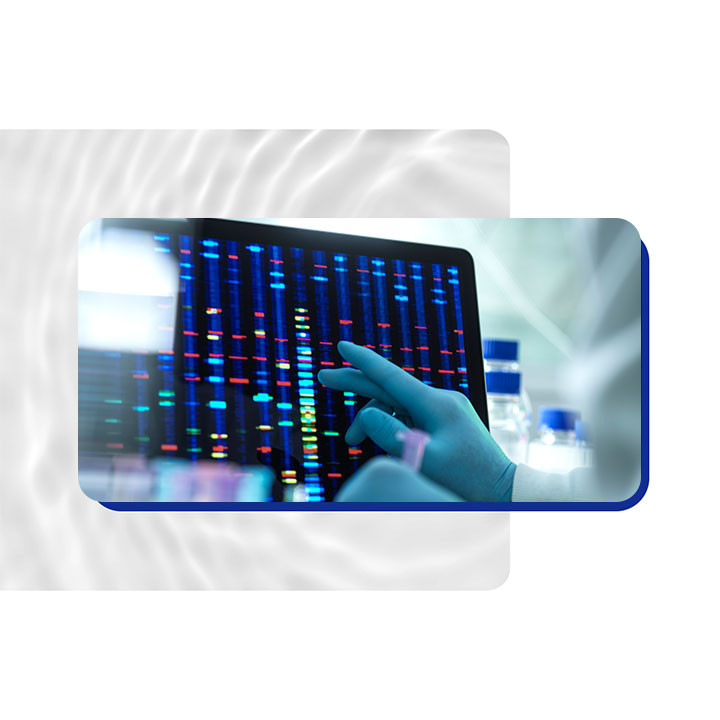Bio-individuality is the concept that each of us has a unique set of genes and environmental factors that influence how we respond to food, exercise, and other determinants of health.
The relevance of bio-individuality to nutrition is that there’s no one-size-fits-all approach to eating or supplements. What works for one person may not work for another.
Everyone has a different genetic makeup, so it makes sense that an individualised approach to nutrition could lead to better health outcomes—this is what nutrigenomics is all about.
What is Nutrigenomics?
Nutrigenomics (also called nutritional genomics) studies how genes interact with nutrients and how this interaction affects our health. It’s personalised to you based on your unique genetic makeup.
The goal of nutrigenomics is to use genetic information to recommend the best diet and lifestyle for optimising health. This science is still relatively new, but it’s growing rapidly, and there is already a wealth of information available on how different nutrients affect our genes
Nutrigenomics considers how the nutrients in our food or supplements may affect the expression of genes that oversee metabolic pathways—how we use nutrients from food or supplements—in the body. Nutrigenomics also examines how genes influence the absorption and metabolism of those nutrients.1
Research has shown that genetics can affect health in many different ways, such as:
- Nutrient metabolism. The way our bodies metabolise (or break down) nutrients can be affected by our genes. For example, genetic variants can affect lipid metabolism, influencing cholesterol levels and heart health.2 Even whether or not someone responds well to a specific dietary pattern can be controlled by genes.3
- Appetite. Genes can also affect appetite and how much we eat. People with certain variations in the expression of genes responsible for hunger and satiety hormones can influence eating behaviours and even food cravings.4
- Weight management. Our genes can also affect our weight and whether we have difficulty maintaining a healthy weight.5
- Insulin signalling. The way our body responds to insulin (a hormone that helps control blood sugar levels) can be affected by our genes. For example, people with a specific variation in the gene IRS1 may have an increased risk for blood sugar dysregulation.6
Needless to say, nutrigenomics is a new and exciting area of research with the potential to revolutionise the way we approach nutrition. Understanding how genes interact with nutrients can help practitioners make more personalised recommendations for optimal health.

SNPs and Nutrigenomics
Single nucleotide polymorphisms (SNPs, pronounced “snips”) are the most common type of genetic variation. They are changes in a single DNA base (the building blocks of our genes) when one letter of the DNA sequence differs from the “normal” sequence.1
Scientists have found more than 600 million SNPs in humans around the world.1 While most SNPs don’t affect a person’s health, some can influence how someone metabolises nutrients. For example, someone with a SNP in the gene that codes for Vitamin D receptors may not be able to efficiently use vitamin D.7
Another example is weight loss. Different genes can affect how we metabolise macronutrients, translating to how we respond to diets for weight loss.8
SNPs can even impact how physical activity affects body fat or metabolic rate, which helps explain why there’s so much variation between how people respond to diet patterns and exercise.9,10
Genetic Testing and Nutrigenomics
Genetic testing allows consumers to use nutrigenomics to optimise health. Testing can look for SNPs that may affect how you respond to food and nutrients and use them to tailor diet and lifestyle recommendations.
While it’s exciting that there are many direct-to-consumer tests available, it’s important to work with a practitioner trained in nutrigenomics to interpret your results and make recommendations to support your health. Remember, not all genetic variants will impact your health, so a practitioner can help you sort through the information to find what is most relevant to you and what actually matters.1
Research also suggests that knowing that a recommendation is personalised to you may increase motivation to follow it. Unlike a general, blanket approach—which we know doesn’t always work when it comes to long-term health changes—an individualised plan can give you more confidence that you are making the right choices for your body.11 Having a tailored plan can be helpful for the nutritional recommendations themselves and also increase your likelihood of successfully sticking with the plan.

Personalised Supplementation and Nutrigenomics
Once you have your genetic test results, nutritional supplements can be personalised based on your unique genetic makeup. Supplements can be tailored to support detoxification, immune response, and so many other aspects of health.
For example, someone with a SNP in the MTHFR gene may need a special form of folate. MTHFR (methylenetetrahydrofolate reductase) is an enzyme necessary for the methylation process, so having the MTHFR gene means that someone may have difficulty with methylation. MTHFR is needed to make enough active folate, a critical nutrient in this pathway.12
Methylation is essential for so many biochemical reactions in the body, including the production of hormones, DNA, and neurotransmitters. It’s also needed for healthy energy production and nutrient metabolism.13
If someone has the MTHFR gene, they may be unable to make enough active folate, so all these pathways are affected. But genetic testing can determine if this is a problem, and supplementing with a methylated form of folate can help.14
Vitamin D status is influenced by genetic and environmental determinants. Similarly, someone unable to efficiently use vitamin D may need a higher dose than someone with a SNP reported to be associated with vitamin D-related traits. This SNP means that the person may need to supplement with more vitamin D to maintain adequate levels in the blood because they can’t absorb it as efficiently.15
Nutrigenomics Could Be the Future of Nutrition
Nutrigenomics is the study of how genes and nutrition interact. It is a new and growing field, and research suggests that it has the potential to improve our understanding of how to optimise health on an individual level.
If you are interested in learning more about your nutrigenomic profile, work with a qualified practitioner who can help you interpret your results and make recommendations.
The future of nutrition is personalised, and nutrigenomics may be at the forefront of this exciting new field!
+Caitlin Beale, MS, RDN is a registered dietitian and freelance health writer. She has a master’s degree in nutrition and over ten years of experience as a registered dietitian.
+The views expressed in this article are those of the authors. They do not reflect the opinions or views of Pure Encapsulations®.
1 Farhud D, Zarif Yeganeh M, Zarif Yeganeh M. Nutrigenomics and nutrigenetics. Iran J Public Health. 2010;39(4):1-14. Epub 2010 Dec 31. PMID: 23113033; PMCID: PMC3481686.
2 Waterworth DM, et al. Genetic variants influencing circulating lipid levels and risk of coronary artery disease. Arterioscler Thromb Vasc Biol. 2010 Nov;30(11):2264-76. doi: 10.1161/ATVBAHA.109.201020. Epub 2010 Sep 23. PMID: 20864672; PMCID: PMC3891568.
3 Barrea L, Annunziata G, Bordoni L, et al. Int J Obes Suppl. 2020;10(1):1-13. doi:10.1038/s41367-020-0014-4
4 Sanchez-Murguia T, Torres-Castillo N, Magaña-de la Vega L, Rodríguez-Reyes SC, Campos-Pérez W, Martínez-López E. Role of Leu72Met of GHRL and Gln223Arg of LEPR Variants on Food Intake, Subjective Appetite, and Hunger-Satiety Hormones. Nutrients. 2022;14(10):2100. Published 2022 May 18. doi:10.3390/nu14102100
5 Ramos-Lopez O, Milagro FI, Allayee H, et al. J Nutrigenet Nutrigenomics. 2017;10(1-2):43-62. doi:10.1159/000477729
6 Kovacs P, Hanson RL, Lee YH, et al. Diabetes. 2003;52(12):3005-3009. doi:10.2337/diabetes.52.12.3005
7 Tomei S, Singh P, Mathew R, et al. The Role of Polymorphisms in Vitamin D-Related Genes in Response to Vitamin D Supplementation. Nutrients. 2020;12(9):2608. Published 2020 Aug 27. doi:10.3390/nu12092608
8 Qi Q, Downer MK, Kilpeläinen TO, et al. Dietary Intake, FTO Genetic Variants, and Adiposity: A Combined Analysis of Over 16,000 Children and Adolescents. Diabetes. 2015;64(7):2467-2476. doi:10.2337/db14-1629
9 Zhang X, Qi Q, Zhang C, et al. FTO genotype and 2-year change in body composition and fat distribution in response to weight-loss diets: the POUNDS LOST Trial [published correction appears in Diabetes. 2013 Feb;62(2):662. Smith, Steven R [added]; Bray, George A [added]]. Diabetes. 2012;61(11):3005-3011. doi:10.2337/db11-1799
10 Andreasen CH, Stender-Petersen KL, Mogensen MS, et al. Low physical activity accentuates the effect of the FTO rs9939609 polymorphism on body fat accumulation. Diabetes. 2008;57(1):95-101. doi:10.2337/db07-0910
11 Nielsen DE, El-Sohemy A. A randomized trial of genetic information for personalized nutrition. Genes Nutr. 2012;7(4):559-566. doi:10.1007/s12263-012-0290-x
12 Crider KS, Yang TP, Berry RJ, Bailey LB. Folate and DNA methylation: a review of molecular mechanisms and the evidence for folate’s role. Adv Nutr. 2012;3(1):21-38. doi:10.3945/an.111.000992
13 Allison J, Kaliszewska A, Uceda S, Reiriz M, Arias N. Targeting DNA Methylation in the Adult Brain through Diet. Nutrients. 2021 Nov 8;13(11):3979. doi: 10.3390/nu13113979. PMID: 34836233; PMCID: PMC8618930.
14 Vidmar Golja M, Šmid A, Karas Kuželički N, Trontelj J, Geršak K, Mlinarič-Raščan I. Folate Insufficiency Due to MTHFR Deficiency Is Bypassed by 5-Methyltetrahydrofolate. J Clin Med. 2020;9(9):2836. Published 2020 Sep 2. doi:10.3390/jcm9092836
15 Tomei S, Singh P, Mathew R, et al. The Role of Polymorphisms in Vitamin D-Related Genes in Response to Vitamin D Supplementation. Nutrients. 2020;12(9):2608. Published 2020 Aug 27. doi:10.3390/nu12092608

